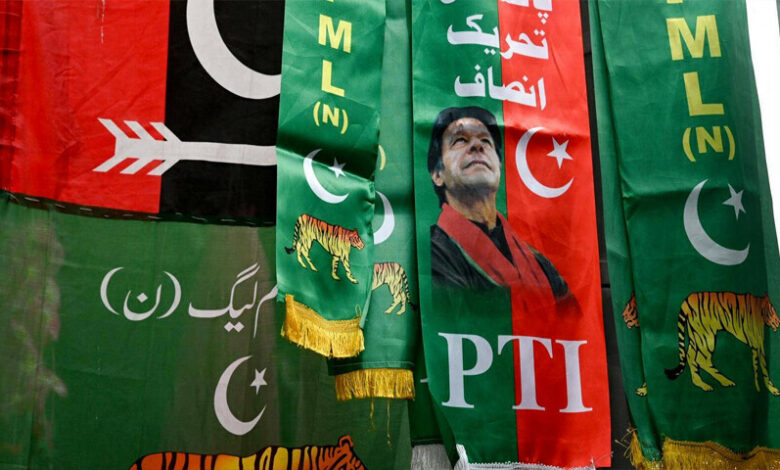
In Khyber Pakhtunkhwa, independent candidates backed by Pakistan Tehreek-e-Insaf (PTI) secured a resounding victory, dealing a significant blow to nationalist and federal political parties in the province.
Analysts attribute this defeat to what they see as a backlash from the public against the establishment, particularly for its role in forming the Pakistan Democratic Movement (PDM) government and the unpopular decisions made within it.
According to Pakistani media reports, among the total 113 seats in Khyber Pakhtunkhwa, independent candidates supported by PTI clinched 73 seats, while Pakistan Muslim League-N (PML-N) secured 4, Pakistan Peoples Party (PPP) 3, Jamiat Ulema-e-Islam 2, and Awami National Party (ANP) 1 seat. Independent candidates emerged victorious in 42 out of 44 national seats.
Also Read: Political Landscape Shifts as Key Figures Face Defeat in Pakistan Elections
Notable independent candidates declared successful in the National Assembly include Asad Qaiser, Umar Ayub, Sheheryar Afridi, Ali Mohammad Khan, Shahram Tarakai, Atif Khan, and Shandana Gulzar. On the flip side, prominent leaders who faced defeat include Amir Haider Khan Hoti, Aimal Wali Khan, Ghulam Ahmad Bilour, Aftab Ahmad Khan Sherpao, Pervaiz Khattak, and Amir Muqam.
Analysts posit that the principal factor behind the defeat of political party candidates lies in the formation of the government under the banner of the Pakistan Democratic Movement (PDM). The backing of these parties by the establishment, coupled with public dissatisfaction and a perceived vendetta against recent inflation in the country, contributed to their electoral setbacks.
Senior journalist and analyst Haq Nawaz Khan emphasized that while winning and losing are inherent to democracy, the general elections witnessed unimpeded support from Imran Khan's followers, leading to the triumph of independent candidates.
He pointed out that when the PDM government took charge after Imran Khan's tenure, instead of mitigating inflation, it escalated, causing losses for political parties, including the Awami National Party and the National Party. Despite ANP's later separation from PDM, the public still associated them with the responsibility for inflation.
Nawaz clarified a second reason, noting that how Imran Khan was ousted from the government led people, particularly the youth, to believe that political parties played a role in his removal. As a result, supporters leaned towards independent candidates in the elections.
According to Haq Nawaz, except Pakistan Tehreek-e-Insaf (PTI), all political parties in Khyber Pakhtunkhwa conducted robust political campaigns. However, a substantial number of youth and PTI workers, as indicated in the recent census, believed that the establishment did not provide a fair playing field to PTIs. Haq Nawaz suggests that they used their votes as a form of political revenge against the establishment.
Contrary to this perspective, senior journalist and analyst Syed Shah Raza Shah dismisses the notion that inflation and unpopular decisions in the PDM government were the sole factors behind the victory of independent candidates.
According to Shah, the major political parties in PDM, namely Pakistan Muslim League-N and People's Party, made unpopular decisions, yet they enjoyed the support of their constituents.
He believes the election results in Khyber Pakhtunkhwa were not surprising, attributing them to the youth seeking retribution by voting against those involved in the events of May 9. However, he notes that PTI's narrative of a lack of a level playing field in the election has now diminished.
Shah Raza Shah critiques the political strategy of defeated parties, stating that people in Khyber Pakhtunkhwa do not base their decisions on party manifestos and achievements but rather on emotions. He contends that political parties neglected these emotional factors, leading to losses in the election due to a campaign that did not resonate with the sentiments of the people.
The legal status and future of the victorious independent candidates raise questions. In response, Supreme Court lawyer Noor Alam explains that, according to the law, independent candidates must join a political parliamentary party within three days after taking the oath.
He further clarifies that a meeting is convened in Parliament after the election, during which elected representatives take the oath and are obligated to join a political party before the parliamentary election. This action also contributes to an increase in the number of reserved seats for minorities and women within the respective party.
Alam emphasizes that independent representatives cannot form their party or represent themselves as part of a political party outside Parliament.